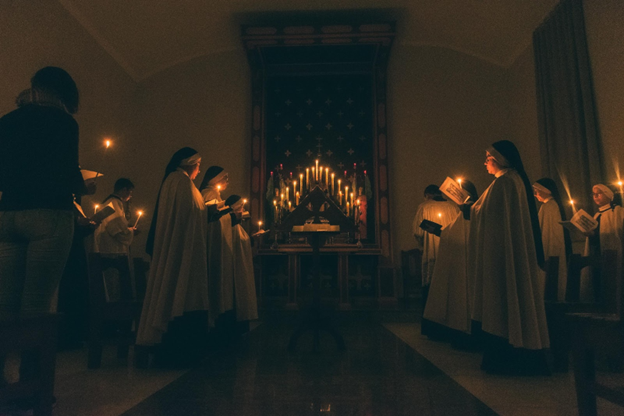On the 13th and 14th of April, World Religions students went to the chapel to listen to presentations from one priest (Father Nicholas Morrison from Saint Peter’s Parish) and three nuns from an order known as the Servants of the Lord & the Virgin of Matará. They called themselves, “Sister Jerusalem,” “Sister Chosen Spouse,” and “Sister Immaculate.” Nuns in this order take religious names, and no two nuns have the same name. All names are titles that people use to describe Mary, the mother of Jesus.
Father Morrison spoke first, giving a comprehensive speech on the nature of vocations. He believes that vocations are what God wants you to do in your life. Yet, there are conditions for vocations. He said that God will not scare you into your vocation, and your true vocation might not be what you believe it to be at first. Both the priest and nuns talked about not originally wanting to work in their vocations. Yet, they were convinced to go against their initial wishes. This ties into Father Morrison’s reminder that vocations are not always what you originally believe them to be.
Then the sisters talked about their experiences. They work on spreading the faith in developed countries in North America and Europe, doing whatever assignments the Mother Superior commands them to do. They said that Europe is particularly resistant to accepting religion. Europe has already experienced a lot of damage and warfare over religion, and centuries of intellectual development have led to a jaded and suspicious attitude toward religious superstition. The nuns have also served in slums. Once, they met a girl whose family life was troubled. Yet, befriending the nuns inspired the girl to start going to church, even though her family did not. The nuns happened to see her walking into church from a distance, and they almost couldn’t contain their excitement. They wanted to go and talk to the girl, but they didn’t want to scare her away from attending.
Inside of developed countries, the nuns’ main targets are younger people, whom they wish to convince to become religious and even priests, nuns, or monks. It is worth noting that all three of the religious speakers were young and dynamic. The nuns play sports (like basketball and a form of ultimate frisbee) and use this fact to convince the students that the cloisters aren’t as dreary as people believe.
However, some nuns within the order have other audiences. Some go to developing countries and preach their religion to people who have never heard of Jesus Christ. The nuns claimed that many people agreed to baptism very soon after first hearing of Christianity from the nuns. It seems that the nuns have the most success converting to their faith those who know little about it in the first place.
The speakers were convinced that a few of the students in each class will have religious vocations. Yet, pursuing religious professions can be difficult. Women spend time with the nuns for up to a year so they can decide if they want to take vows and become nuns themselves. Meanwhile, Father Morrison had to spend a lot of time studying theology in a seminary, so he had to be very committed to his priestly plans. He and the nuns had to agree to celibacy, and the nuns also avoid using technology too much. For example, they may only email their families infrequently. The nuns ask for donations of food, since they have no paid employment themselves.
At the end of the presentations, the students received cards on which they could print contact information, allowing the religious speakers to continue to communicate.

